|
Derek Cianfrance caps a trilogy of sorts with The Place Beyond the Pines. His little seen debut Brothers Tied dealt with siblings cut from different cloth and was followed by the arthouse acceptance of Blue Valentine's husbands and wives. His latest is all about father and sons – or more specifically, sons tainted by their father's sins and doomed to repeat the same mistakes.
Motorcycle stunt-performer Luke Glanton (Ryan Gosling) turns bank robber once he learns of the son he never knew he had with downtrodden waitress (Eva Mendes). Luke's crime spree is short-lived when he comes up against golden boy cop Avery Cross (Bradley Cooper). It's a collision that has dire consequences for both men and later their two sons (Dane DeHaan and Emory Cohen), classmates at the same school who fall into an unlikely friendship, completely unaware of the history between fathers on different sides of the law, which set them both down equally ruinous paths.
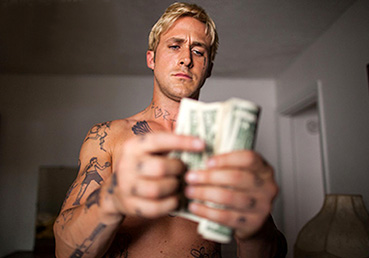
If Pines is congruent with Cianfrance's preoccupation with fractured families, its multi-generational narrative with a budget to match, never once lets us forget the scale of the piece and the "epicness" it so often strains for. Told in triptych, this two and a half hour tragedy is essentially three different films, crammed with enough material to fill a mini-series, each "episode" introducing new characters and wildly different genre elements. Directorially, this mélange of stories can't escape a certain televisual quality, in as much as it feels like a small stable of filmmakers have authored the whole. Faith No More frontman-turned-film composer Mike Patton embraces these venturesome tempo changes in his film score, which ranges from foreboding instrumental din to tranquil, sparse arrangements like the thickening and lifting of heavy sonic fog over the pines.
In an effort to keep the tone consistent, Cianfrance and co-writers Ben Coccio and Darius Marder's twining of destines feels over determined in both the action and the details. Tying it all together so assiduously, story is subject to theme, the poetics laid on pretty thick to ensure it resonates.
Identical shots of Luke and his son bombing down the same road on their motorcycles decades apart are set to the twinkling chimes and angelic vocal melody of Ennio Morricone's "Ninna Nanna Per Adulteri", a sky high crane shot also evoking the heavens as it omnisciently trails them like the fate neither can out-ride.
Meretricious rather than moving, such overblown moments signify depth that isn't there. Even the title makes a false claim for subtextual analysis. What is this place beyond the pines? Is it literally a place where two men whose lives are intertwined in ways they can't conceive will wreck terrible retribution upon one another? Is it a metaphysical space where the poisonous legacy that corrupts the next generation will finally be remedied? For a film full of grandiloquent gestures, you'd expect such a literary sounding title to bear some sort of Wagnerian weight. But no. It turns out, the place beyond the pines is simply the Iroquoian translation of Schenectady, the upstate New York location where the story takes place and the film didn't even bother to tell me that much, I had to look it up on Wikipedia.
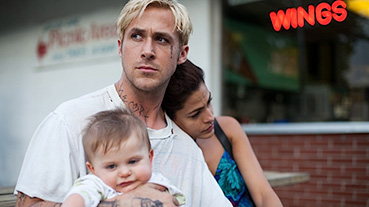
For much of its running time The Place Beyond the Pines seems like an elaborately constructed excuse to play at Greek tragedy, replete with portentous purple prose. "If you ride like lightening, you're gonna crash like thunder" coos Ben Mendelsohn's off the grid criminal mentor, who despite being given the film's corniest dialogue also gives the best performance, one that will likely go unsung amidst Gosling's heavy metal approximation of James Dean, Bradley Cooper doing his darndest to prove his dramatic mettle once again and the rising star of current "it kid" Dane DeHaan. But don't worry. If Mendelsohn's performance and grave warnings somehow manage to pass you by, Gosling spends half the film in a cut-off vest sporting the album cover of Metallica's "Ride the Lightning", its prominently placed electric chair letting us know right from the get go he's on a one-way ticket to the big house in the sky. Like Avery, whose ambitions to be his own man are so eager he realizes too late that he's only ever supposed to be his father's son, Cianfrance ardently announces how fate has other plans for these characters, rarely allowing us to connect the dots for ourselves.
These highfalutin generational baton passes rub up the wrong way against the raw immediacy of soft-spoken scenes and their naturalistic staging, the style Cianfrance seems most comfortable in and that which he's carried across from Blue Valentine, despite switching cinematographers at the last minute. Sean Bobbitt (Shame) replaced Andrij Parekh (Half Nelson) after new dad Parekh dreamt that he died whilst shooting the film. Later, Bobbitt came close enough when attempting to finish the film's bravura opening shot by standing dead centre, inside the Globe of Death, a mesh sphere in which multiple motorcycles race round at high speed. Twice the shot was cut short when Bobbitt found himself at the bottom of a vehicular pile-up and after being knocked unconscious the second time, Cianfrance demanded his DP conclude the shot standing safely outside the Globe.
The shot itself, following Luke from behind Dardenne style as he makes his way through a packed fairground to the applause of vicarious thrill seekers is technically impressive and moodily intriguing. Focusing on a pumped up Gosling's peroxide mop and jailhouse tattoos long before we see his face, this is the point at which he's cleverly substituted for a stunt double who rides into the Globe of Death in his place. If the film's likely to be remembered for anything it'll be for this sequence, Gosling affecting the same silent but deadly swagger that set girls swooning in Drive and helped it attain instant cult classic status. A two-wheel equivalent to Nicolas Winding Refn's film in many ways, Gosling plays to his strengths as a cooler than thou stunt driver of very few words who parlays his unusual skillset into robberies. As in Drive he also finds work at a repair shop and is taken under the tutelage of an older burnout.
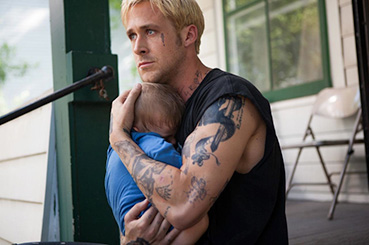
Though big on style, unlike Drive, Pines is not as self-consciously cool, Luke being much more of a relatable character and recognizable human being than the representational archetype of the Driver. In Drive, Gosling was a near catatonic cipher, here, in similar moments when he's saying nothing (not even reacting, just being still) Gosling does some of his best work. A close-up in which we see his baby son's soft skin against Luke's, rough and etched in ink, is a tellingly tragic juxtaposition that anticipates the height of the child's eventual fall. During a scene of domestic dispute concerning his boy, there's a great vérité moment where Gosling the actor, without demonstration, quiets a crying baby the moment he puts him in his arms.
Among many memorable performances in in his short but prolifically significant career, Gosling's work with Cianfrance ranks right up there with his best. In their two collaborations together, Cianfrance has shown a way of chipping away at Gosling's good looks and going deeper than many of his other directors. In both films Gosling's played simmering males with a sensitive side close to the surface, and in both cases he goes so far as defacing his own handsomeness to authenticate it.
Even with all the ugly tattoos in the world, when Cianfrance sets Gosling on "brood", girls' hearts will flutter and men will question their sexuality. Cast against his regular competitor for GQ's world's sexiest man, females in the audience might actually implode from more male hotness than one film can take. In this rough and tumble jungle of hopped up machismo, casting two of Hollywood's most prominent front cover faces makes everything feel a lot less dangerous than it should and somewhat emasculated. Ceding to marquee names above the title, when he isn't harking on thematic connections, Cianfrance remains true to form, bringing that everyday nonchalance, and stripped down truthfulness, so recognizable from Blue Valentine and such a rarity for puffed up big screen crime dramas.
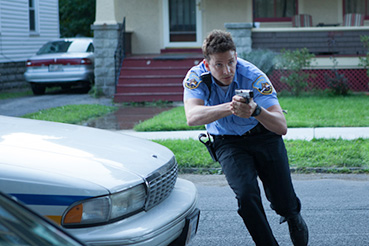
A thrilling chase sequence that comes to an abrupt, ignominious end is comprised of a series of unflinching long takes that pretty near captures the same lighting in a bottle as the opening scene. Taking its cue from the 75 miles an hour real world hot pursuits of "America's Wildest Police Chases" and "Cops", we watch from the dashboard of a trooper car as Luke blows through an intersection. Immediately prior to that, Luke robbing the bank, dashing out to his bike, being unable to start the bike and peeling off just as the cops bear down on him is all shown in one continuous take, combining the New Hollywood naturalism of The Friends of Eddie Coyle with the 100% pure adrenaline rush of Point Break.
Racing out of the gate in its opening act, the movie stalls when it switches from full throttle outlaw to lay-awake-at-night cop with a guilty conscious. Proclaimed a hero by the media for prematurely ending Luke's bank robbing days but raked with remorse over how it went down, Avery buries a dark secret and tries to rectify his mistake by speaking out against the corruption in his own department, a systemic lack of moral rectitude that goes all the way to the district attorney's office. You don't like Avery for what he did to Luke and you like him even less for his law abiding, straight arrow façade that masks political ambition. Neither are you fascinated by him, Cooper content to play righteous indignation at wavering volume, gesticulating inner conflict as if he were still on Oscar alert but never quite grasping the vulnerable ambiguity or psychological nuance of his character.
If this strand of the story feels textbook and way too familiar, Ray Liotta as the bullying alpha cop trying to prevent Avery from ratting on him and his buddies through methods of intimidation is parodic casting. From Cop Land to Narc, he's played the ruthlessly crooked authority figure a dozen times already, though admittedly he still delivers every bent line with imperious relish. On breaking into immigrant Romina's house to retrieve Luke's stolen cash without the proper documents, he delights in the coercionary powers afforded him by his badge. "You assume that I have a warrant, and I assume that your mother has papers."
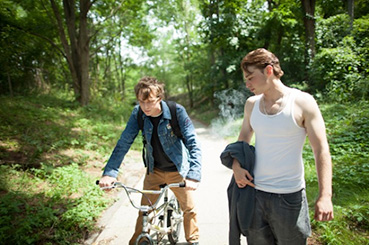
Evidently the make-up department didn't bother showing up for the third section, in which the story jumps forward fifteen years but the adult actors haven't aged a day. The story of Cross and Glanton's offspring buddying up never once rings true. Everybody knows the tribal instincts of the high school cafeteria, where never the entitled rich kid and the gawky loner shall meet. The one thing Jason and AJ have in common is that they're both stoners and that's enough because the script says so. Avery has spawned a Jersey Shore punk in AJ and Cohen plays up shamelessly for the cameras, as if he's on reality television. These primal, unshaped young men lack direction and are scarred by absentee fathers, moping in the style of so many superior indie films about adolescent anomie.
While DeHaan does a decent enough James Dean squint to remind everyone he's Gosling's son, Cohen's brawn and no brain portrayal is a hulking caricature of Brando in low-slung jeans. Suburban white boys acting black is a depressingly persistent stereotype, hardly deserving of this much screen time, especially when Cohen's mannered way of "keeping it gangsta" is more Ali-G than Jay-Z. Like the first draft of a Larry Clark and Harmony Korine collaboration shelved back in the late nineties, it lacks both the director's lewd provocation and the writer's linguistic specificity. More damningly, the entire segment is as uninvolving as it is unconvincing, though the connectedness of everything is at its most subtle here, compensating a signposted conclusion. Luke and Jason both steal things, but the son's means of escape fits the small time nature of his crime, chased out of a pharmacy on a pedal bike instead of a motorcycle.
If you leave with a queasy stomach, it's likely not due to any of the violence but the undercooked, overstuffed, indigestible narrative. It's ironic that his previous, modest two-hander with parallel time lines was so emotionally concentrated, yet this bigger ensemble with such a linear, schematic outline is so confused and vague. A filmmaker of unmistakable talent, ambition and big ideas, a transitional film would have helped Cianfrance make the leap from chamber drama to sprawling crime saga. As it is, it's a leap too far, too fast.
|